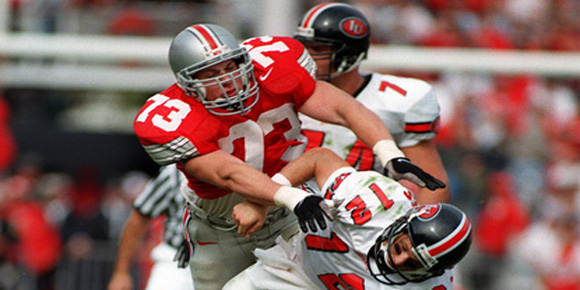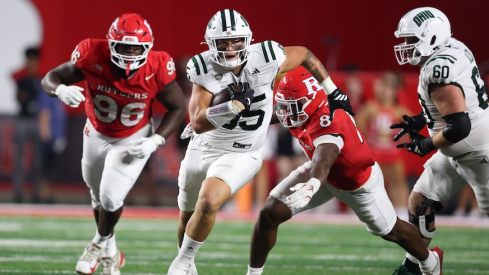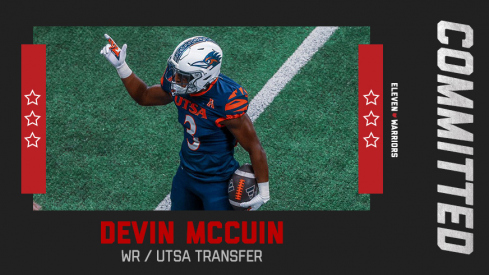
There are changes in attitudes and shifts in how athletes approach their sport with every generation. We’re presently immersed in the Me Generation with an endless fountain of prima donnas. From Chad Johnson to Floyd Mayweather to Tiger Woods, one doesn’t need to look for to find the anti-role model.
There’s long been a debate about the merits of athletes. Should they be considered viable heroes and idols for children? Charles Barkley said no, but plenty of others have differing opinions. It’s not to say sports figures are bad people; they often prove to be upstanding citizens. It’s tough to match them up against service members and first responders, though.
Already in the five months of 2013, tragedies have been a theme of the year. And with each dose of heartache, those charged with protecting us have risen to the occasion. It was never more apparent than in the streets of Boston when police officers ran toward bomb blasts with terror surrounding them.
Former Ohio State football player Joe Brown is the definition of selfless. From undrafted free agent to an NFL career, Brown knows what hard work is. In 2003, as he was set to enter his third season in the league, Brown, a defensive lineman, abruptly left the Seattle Seahawks to pursue another career – defending the country.
The son of a brigadier general in the Air Force and grandson of a POW who died in Korea, Brown's bloodlines run thick with the armed forces. During his career at Ohio State, from 1996-2001, joining the ROTC was a goal, but then-head coach John Cooper nixed that idea.
“I’m not going to question that at all,” said Brown, remembering the decision. “I just kind of shelved it and moved on.”
But not totally. There was still a void. Then 9/11 happened.
“There were times I’d be at practice playing football in the NFL and I’d be sitting there thinking about joining the service and how I would do it,” Brown said. “And I’d think, ‘you’re crazy.’”
However, a bout of Valley fever put in motion that very plan. When Brown came down with the fungal disease prior to training camp in 2003, he opted to join the Army as a special operations solider.
Just a year earlier, Pat Tillman abandoned an All-Pro career to join the elite group of special forces known as the Army Rangers. The Seahawks organization was supportive of Brown’s decision with head coach Mike Holmgren and defensive line coach Larry Brooks – “great guys” in Brown’s words – offering unwavering encouragement. But his agent disagreed with the career choice and the two have never spoken since.
“A lot went into that decision,” said Brown, who received his wife's blessing. “It was really just put on my heart. I felt as though the lord was leading me to go serve the country. We were in the Global War on Terrorism at the time and I was playing football. I thought I needed to put football on hold and go serve the country. If football is still available when I’m done, great. If it’s not, great. It was just a decision I couldn’t ignore.”
Brown had a successful first deployment to Iraq in 2005. It looked like the dream of returning to football would come true until another deployment in 2007 put a halt to those plans. A few months later, he was in southeast Baghdad calling in an airstrike when he fell 30 feet down a stairway shaft, shredding his calf and striking his head.
When Brown woke up in Germany, an intense reality hit him. Years later, he still gets goose bumps reciting the story. Severe bleeding in his brain left Brown unable to speak and ended his football and combat career all at once. Contributing to the troubles was having a wife back home that already gave birth to one child and was pregnant with another.
“Special ops soldiers, those aren’t soldiers, those are athletes that play the ultimate game. But it’s not a game, it’s life and death.”
“I had an incredible amount of anxiety,” he said. “You go from combat to waking up in a hospital room. I couldn’t speak and I knew I couldn’t speak. The speech came quickly, but I had real fragmented speech. Being inundated with information and being told you’re going to be there for two years did not sit well with me. I had a family to take care of. Getting though your treatments and figuring out where you’re going next, there’s a lot to that.”
There were several moves until Brown finally settled in at Brooke Army Medical Hospital in San Antonio, where he spent nearly a year rehabbing. Brown believes he had an advantage over most soldiers because of his past as an athlete. Being an elite solider only gave him more time to learn his body and its limits.
An awareness of the strengths and weaknesses allowed Brown to return to civilian life quicker than expected. A scar from the night vision goggles that were smashed into his face and occasional headaches are reminders of what occurred half a world away. Brown is thankful, though, that he was able to pick up the pieces and return to a life with a wife and two kids.
“Every soldier that’s injured probably can speak differently to it,” he said of the rehab process. “Special ops soldiers, those aren’t soldiers, those are athletes that play the ultimate game. But it’s not a game, it’s life and death.
“We have to figure out a plan and work toward that every day. Every solider goes through a period where they sit there and suck their thumb, but you have to get past that. You owe it to the veterans and the solders that didn’t make it back and have an opportunity to rehab and to get back with their wives and their kids. Everything that I had power over, I did the best possible job I could do.”
No soldier enlists with thoughts of being injured in combat on their mind. Regardless, Brown has zero regrets. Had he not fulfilled that chapter he believes there would be a sense of what if. The entire experience, both good and bad, shaped his life for the better.
“Joining the Army was an absolute blessing on my life,” Brown said. “There were some unbelievably tough moments, tough times, tough periods that defined me as a man, as a father and as a husband that are unshakeable. It was just a fantastic experience. To say it was easy would be an injustice.”
The next thing that molded Brown was his return to everyday normal life. It started in Jonesboro, Ark., at Arkansas State University. Being injured closed several doors while opening others at the same time. Brown enrolled in graduate school and began coaching college football.
The former Buckeye had an affinity for the sport and became a natural. He fell in love with a new aspect of football – giving back. But the demands of the profession didn’t mesh with what he envisioned for his post-military life. Brown had just spent years away from his family and now he had to spend all his time at a football facility.
“It was an absolute dream,” Brown said. “I loved it. Giving back to those kids every day, it was great. But at the same time, I had two young kids and a wife and I really enjoy them, and we just felt like coaching wasn’t compatible.”
When Brown looked elsewhere he discovered parks and recreation through a friend. Nearly five years later, he’s still knee deep in the profession. Selflessly serving communities has been a goal of Brown’s since his return from Iraq and he accomplishes that every day when he goes to work.
In Texas, the passion for parks and recreation led Brown to developing programs for wounded veterans and people with disabilities. He established an adaptive sports program for those residing in the Fort Hood area that grew to 250 participants.
Wheelchair basketball, hand cycling and sitting volleyball are all part of the docket. Chasing down a quarterback used to be what brought a smile to Brown’s face, then keeping his fellow soldiers safe on the battlefield became his purpose. Now Brown is just trying to better the lives of those who receive the least attention and resources.
“When I look at parks and recreation, I look at building community,” he said. “We tend to make programs for kids, adults and our seniors. But what about people in our communities with physical, visual or intellectual disabilities? What do those people do? And that’s where this whole vision and passion came from. We need to make sure our veterans and people that are disabled have an opportunity to participate in sport and recreational activities.
“Sport is so powerful. People just want the opportunity to be able to participate. That is something that we need to take very serious in our communities and understand that through building those programs and leagues that we are building community spirit.”
Brown harkens back to the halcyon days of his youth in Tucson, Ariz., when life lessons were learned in little league baseball. There was no traveling around the state year round or parents interfering in the lives of their kids. Having fun was a staple of yesteryear whereas today it’s building the next great athlete.
Brown has brought his philosophy with him to Reynoldsburg. He’s in charge of the growing the Columbus suburb’s parks and recreations program and brought along the same passion and excitement that sparked Central Texas in such a positive manner. Parents have also taken a liking to his initiative.
“Lovie Smith came up and asked, ‘Is Ohio State recruiting you?’ I said no, and he said, ‘We are now.’”
This part of the state is familiar to Brown, having been born here and then spending his formative college years in Columbus at Ohio State. He may have grown up in Arizona, but the Buckeyes were never far from Brown’s mind. His parents graduated from the university, beginning a love affair with the football program that exists to this day.
Not many kids in Arizona dream of attending Ohio State, but Brown did so every day in his driveway and front yard. Games of basketball and football came with the fantasy of playing for the Buckeyes. That make-believe life began coming into focus when the 6-foot-6 brute started receiving recruiting letters. A trip to Ohio State’s football camp changed everything.
“Lovie Smith came up and asked, ‘Is Ohio State recruiting you?’ I said no, and he said, ‘We are now.’
“It was outstanding. To play for Ohio State, there is no better place in college football. I definitely showed up as a kid and had a lot of growing to do when I left. It was an outstanding experience for me across for the board.”
He looks back with a different perspective, knowing that those abroad in harms way allow us to live the life we covet. Trips to the supermarket and restaurant don’t come with worries about roadside bombs and suicide attacks. Ohio Stadium sits full on football Saturdays with sounds of joy, optimism and euphoria.
Brown knows whom to thank for his peaceful life on this side of the world. Memorial Day is a special time for the third-generation soldier, but he cautions that it’s not celebratory. Too many men and women have been lost.
Said Brown: “I think about all the relationships and buddies that I met and served with. I think about the guys that lost a limb and didn’t get to play wheelchair basketball. I think about the guys that didn’t make it home. I think long and hard about those individuals that fought the fight for the best team in the world, America, and didn’t get to come home. It’s a weekend of being thankful that I get to be a husband and get to be a dad.”

